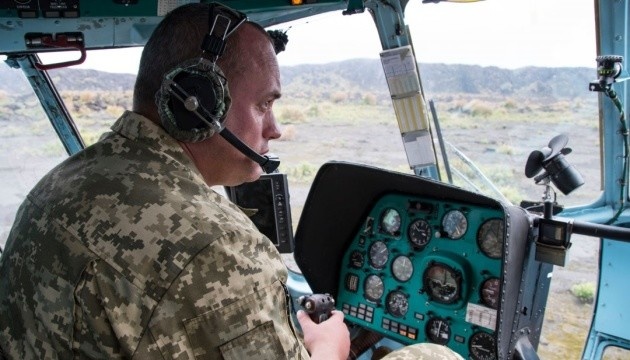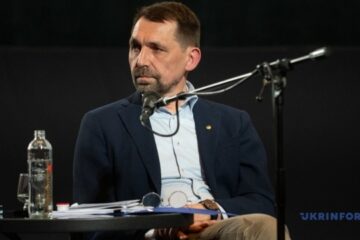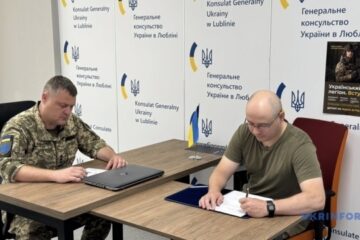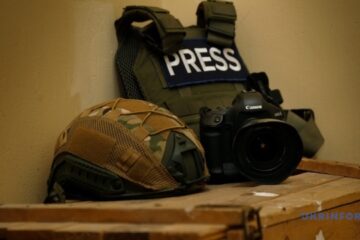Ukraine has been involved in international peacekeeping operations just about since its independence.
In 1992, a Ukrainian peacekeeping battalion was dispatched to war-torn Bosnia and Herzegovina. This was followed by Croatia, Georgia, Kosovo, Iraq, Lebanon, Liberia, Sierra Leone and other countries in Europe, Asia and Africa. At times of peace, peacekeeping missions under the auspices of the UN, OSCE and NATO were the only way to use the armed forces of a war-free country in warlike conditions. Ukrainian servicemen were given the opportunity to gain professional experience, and the country to strengthen its international posture and step up cooperation with partners. Over that time, 55 Ukrainian peacekeepers have died in the line of duty.
After the outbreak of the great war in 2022, all Ukrainian servicemen deployed in five different peacekeeping missions were called back to defend their home country against Russian aggression. Veteran peacekeepers are currently serving as part of the Defense Forces, and Ukrinform pays them honor on the International Day of UN Peacekeepers marked on May 29.
On this occasion, the 1st Information and Communication Support Center of the Ground Forces spoke with Oleksandr Ivanko, a member of the latest iteration of Ukraine’s national contingent to UN Stabilization Mission in the Democratic Republic of the Congo (MONUSCO) and Russian-Ukrainian war veteran.
For your knowledge:
Oleksandr Ivanko, a Retired Captain and aviation engineer, has ten years’ experience serving in the 11th Separate Army Aviation Brigade “Kherson” (based in Chornobayvka outside Kherson), having gone from soldier to officer. Olexandr was involved in the latest, 13th iteration (September 15, 2021 — September 15, 2022) of Ukraine’s national contingent to the UN Mission in the Democratic Republic of the Congo (based in Goma, North Kivu province), serving as part of the 18th Separate Helicopter Squadron of the Armed Forces of Ukraine. Later on, he served as part of the Igor Sikorsky 18th Separate Army Aviation Brigade (stationed in Poltava). He was discharged from service after getting severely wounded in a missile attack in 2024, and is currently engaged in music.
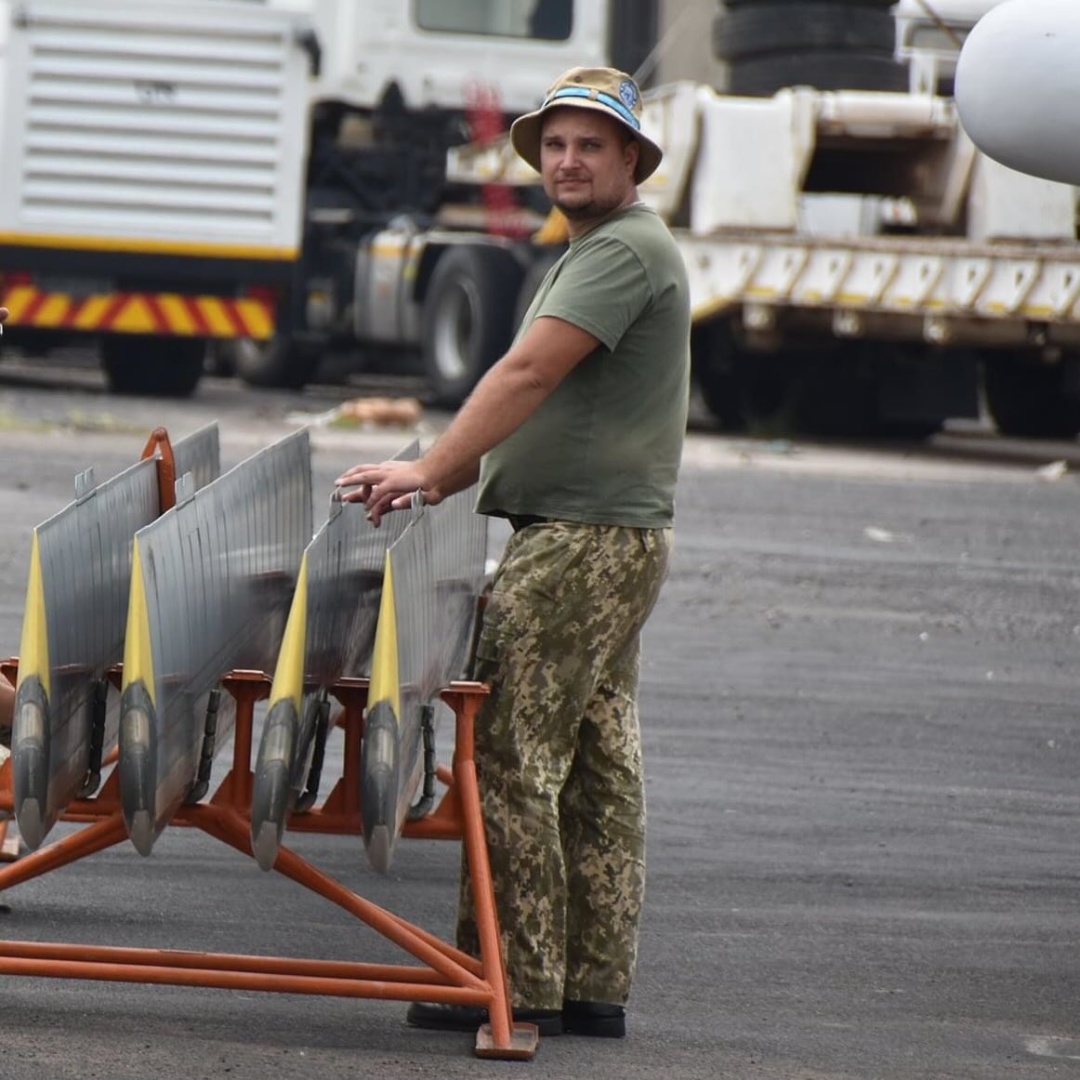
Senior Lieutenant Oleksandr Ivanko, a senior technician at a helicopter and engine servicing and routine maintenance group. Photo Credit: 18th Separate Helicopter Squadron’s press service
How the mission participants were trained
Candidates for the 13th iteration of the Ukrainian peacekeeping force within the UN’s DR Congo mission were selected at the 18th Army Aviation Brigade in Poltava. We practiced, studied, and took tests. The training lasted a month. There were a lot of people. While approximately 250 men arrived for the training, there were 500 of them participating in training assemblies and boot camps, because there were two candidates competing for each position. Those who were more knowledgeable, more experienced, or had more knowledge in a specific domain were selected. Everything was decided by the tests.
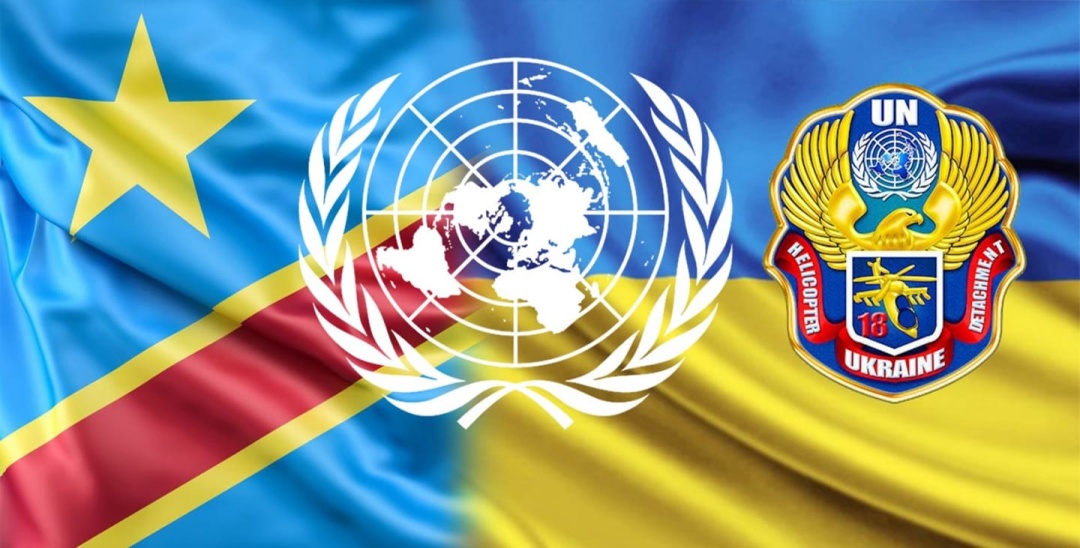
Logos of the 18th Separate Helicopter Squadron. Photo: Facebook of the 18th Separate Helicopter Squadron
Initial impressions from the DR Congo
The first impression, as soon as we got off the plane, was that there was nothing to breathe with. The air was very heavy, although everything around was green. It was green above, and below it was like pink sand, almost red. That is what my initial impression was like – a contrast of green with brown and red and nothing to breathe with.
But night came, and we realized that everything was not that bad. For a person who had never been abroad, it was unusual to see so many dark-skinned people around. It was as if yesterday all those sitting at the Lviv airport were the Europeans, and here you see such a contrast. When driving to our base camp, we noticed all the mess on roads in the DRC. The traffic and the way they drive is scary. Some drive along the left side of the road, others along the right side, and all in the same direction. This is normal for them.
After we arrived at the camp, we were quarantined for two weeks (it was the COVID-19 pandemic). And during this time, adaptation went well. We were already able to get used to the local weather and the food. We were fed well, because our guys cooked for us. If someone had a birthday, we could ask the cooks to prepare something the birthday boy liked, for example, Dressed Herring or Olivier salad. True, after the year I spent in that country, I came to hate three dishes: bananas, chicken and rice. Chicken was served almost every day, and bananas are like apples in our home country. You could buy a whole bunch for a dollar. Despite I returned to Ukraine a long time ago, I still dislike bananas.
What else surprised me was that, in the Congo, the market trades in everything that is grown in Ukraine, including even watermelons.
For your information:
The 18th Separate Helicopter Squadron was part to the UN peacekeeping mission in the Democratic Republic of the Congo since February 2012. In pursuance of Ukrainian Presidential Executive Order No. 114 of March 7, Ukraine sent 13 rotations of its peacekeeping troops to the DR Congo before September 2022, when the latest rotation was called back home.
The missions performed by Ukrainian helicopter pilots included fire support for ground operations; support for rapid response forces; armed escort; search and rescue operations and related fire support; return operations; deterrence and containment; reconnaissance and observation flights; logistical support for the UN Mission; transportation of troops, passengers, VIPs and cargo; observation, reconnaissance and patrolling flights, as well as medical evacuation.
The 18th Helicopter Squadron has logged 22,473 hours in 25,462 flights since its foundation, having carried a total of 116,280 passengers and 5,612 tons of cargo. This includes 3,213 hours flown in 3,702 flights, plus 12,853 passengers and 666.5 tons of cargo carried as part of the 13th rotation (2021–2022). The latest rotation comprised 255 personnel commanded by Colonel Yevhen Vakulenko.
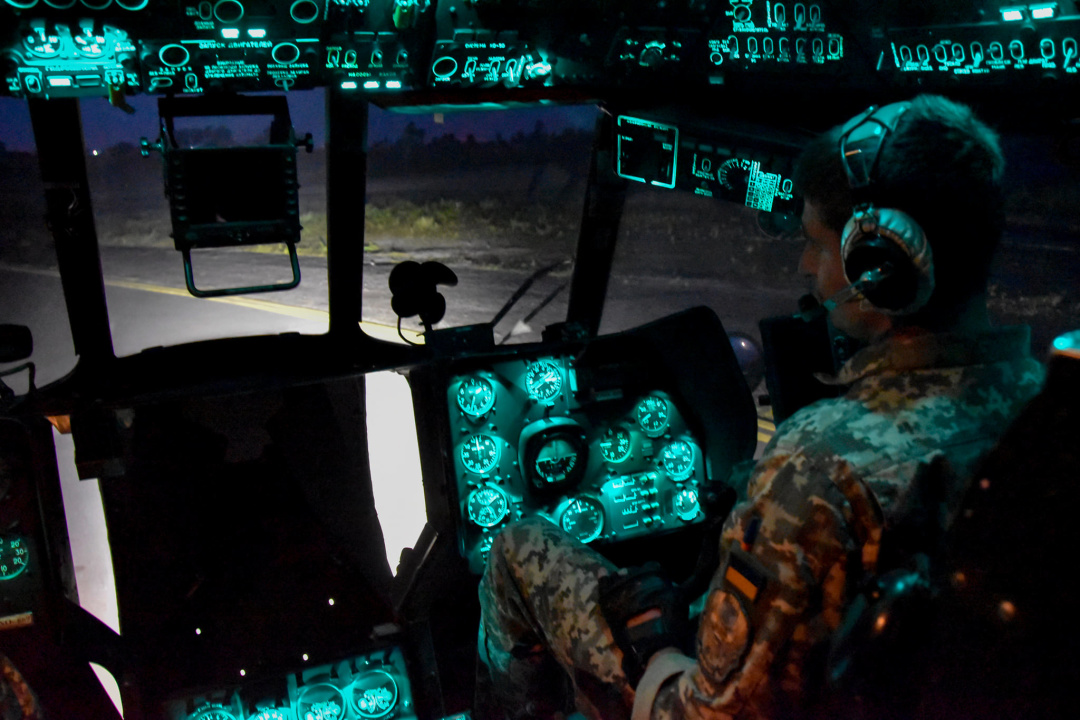
Ukrainian helicopter pilots in the DR Congo flew both day and night missions. Photo Credit: press service of the 18th Separate Helicopter Squadron
Everyone is busy in the Army Aviation
I worked as a senior technician within the helicopter and engine servicing and routine maintenance team. That is, was an aviation engineer. What does an aviation engineer do?
Each vehicle owner knows that the vehicle needs a servicing after a certain number of kilometers run, including particularly a change of oil and filters. Likewise, aviation technicians perform servicing and routine maintenance of a helicopter at a scheduled time and in their specific areas of expertise: engine, airborne equipment and weaponry, radio communication equipment and suchlike. A team of mechanical engineers do repairs on damaged elements. While in automotive vehicles the time between maintenance periods is determined by the number of kilometers run, in helicopters, it is determined by the number of hours flown or maintenance is done on a monthly basis.
That is, after every 25 flight hours, the helicopter must be checked for blade spar pressure. After 50 hours, more comprehensive maintenance is required, including the checks of filters, air induction system and hydraulic system. This is repeated after each 100 hours, 200 hours flown. That is, the helicopter needs to undergo maintenance repairs after each particular number of hours flown. In intensive use scenarios, biweekly inspections are needed. And each team checks the helicopters systems according to its area of expertise so that the aircraft work as appropriate while in flight. Because flight safety is our first priority.
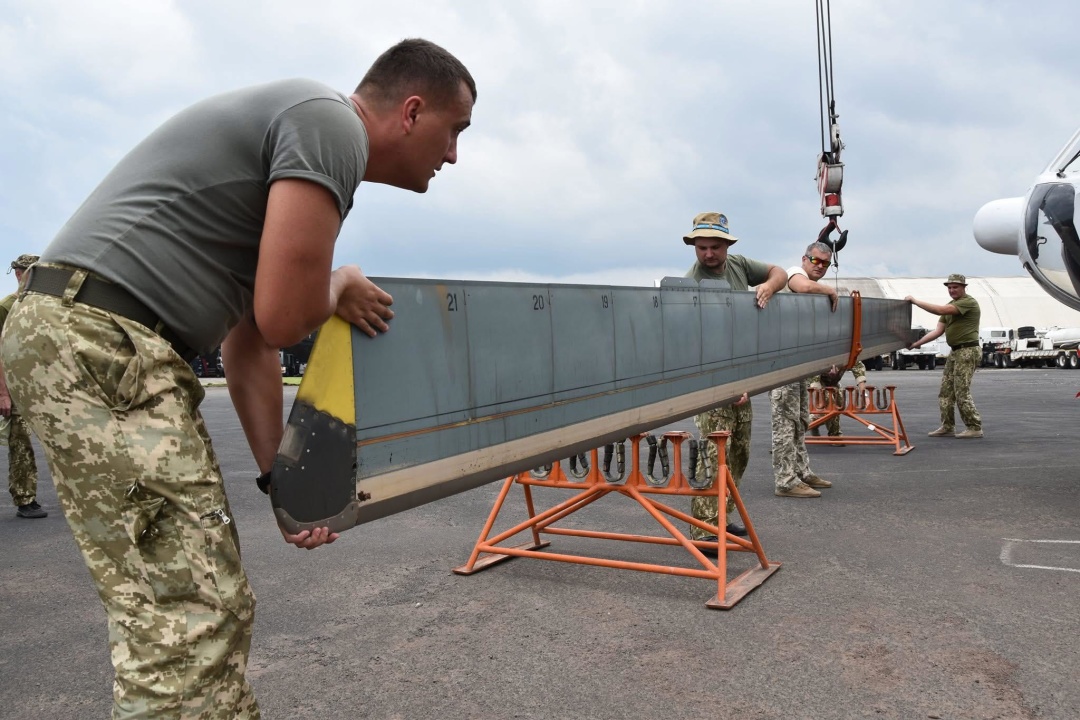
Aviation technicians at work. Photo Credit: press service of the 18th Separate Helicopter Squadron
After each mission performed, aviation technicians inspect the external helicopter fuselage for cracks or other damage. There is a thing such as metal fatigue – a process where repeated stresses cause a metal to weaken and eventually crack or fail, often over time. Aviation technicians find and fix such cracks to prevent the fuselage from further destruction. Technicians specializing in airborne equipment maintain and calibrate the onboard instruments to ensure the data they display is accurate and reliable. Specialists in radio communication check the warning and communication systems, and those specializing in weapons would check cannons, machine guns, all mounted weapons. That is, everyone is busy.
That’s how we lived and worked, in a way. Every day we had work to do: we serviced, maintained, looked after, checked. Where equipment failed, we replaced it. And so this year passed.
There were 12 personnel in my team, comprised of the team leader, 4-5 senior technicians (holding the ranks of senior lieutenants or captains), the others being sergeants and soldiers assigned to work with us. In the Army Aviation, a concept such as a “subordinate” exists, rather, formally. In reality, there is no such thing as a soldier is working while a senior lieutenant stands next to him smoking. Everyone works, they would also smoke together.
We treated each other as equals. In the Army Aviation, interpersonal relations are not like they are in other branches of the military, maybe similar, to a degree, to those in the Air Force. The pilot understands that the life of his helicopter and of his own depend on the engineer. By getting into the aircraft, he thereby implies that he trusts the engineering personnel who serviced this equipment. There were eight Mi-8 helicopters in our rotation: four tailored for transport missions and as many for combat missions. The former were used solely for the transportation of passengers and cargo. Lots of missions had been flown involving the evacuation of injured or seriously sick local patients to remote corners of the country, as well as the transportation of humanitarian cargo, weapons and personnel to locations of friendly forces.
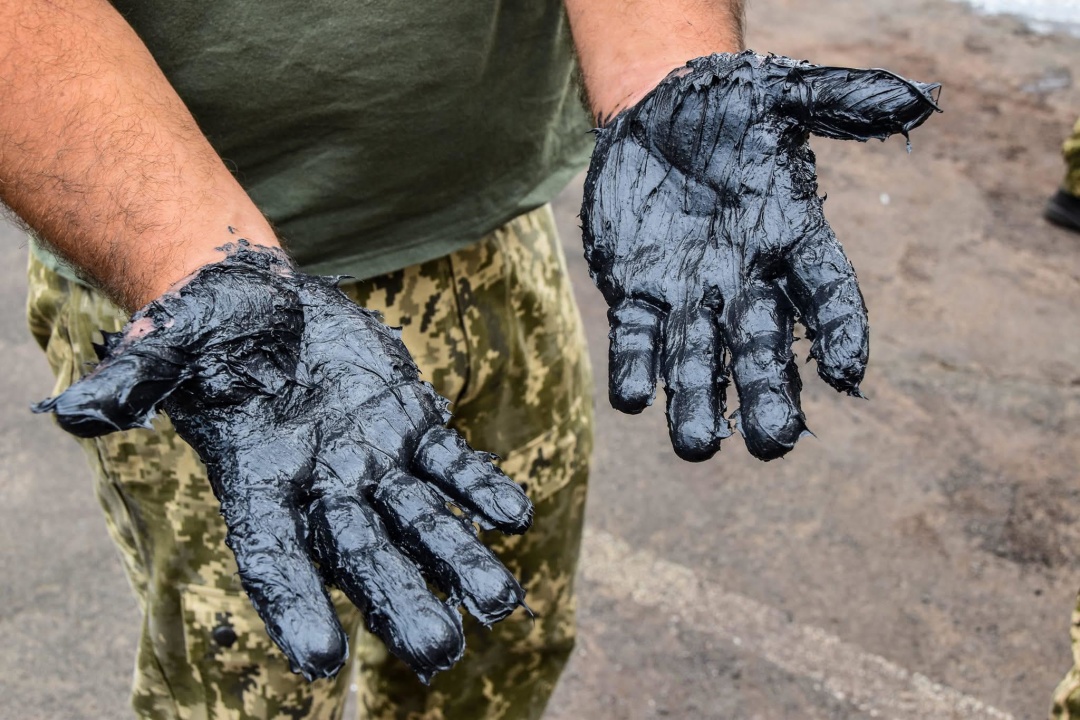
Oleksandr Ivanko’s hands as they look like at the end of the working day. Photo Credit: press service of the 18th Separate Helicopter Squadron
And the latter flew out on combat missions, armed with weapons mounted on external pylons. As our MONUSCO rotation was coming to an end, just at the time when all-out invasion began in Ukraine, rebellions broke out in the DR Congo. It was pretty often that our aircraft would return from missions damaged after fired upon. At one point we even were preparing for an evacuation from the Congo, because a wave of riots began among the civilians. In one situation, for example, our bus was pelted with stones while driving from the airport to our base.
In January 2022, Ukrainian peacekeepers from the 18th Helicopter Squadron destroyed a rebel base. The collaborative operation between the Congolese and Ugandan armies against the terrorist group “Alliance of Democratic Forces” (ADF) has been ongoing since December 2021. To protect the civilians, the leaders of the UN Mission to the DR Congo instructed Ukrainian Mi-8 helicopters to attack pre-identified military targets in the Bunia area. All the targets were engaged and destroyed.
In the period from July 25 to August 1, 2022, protests against the UN Mission were raging as Congolese politicians were accusing it of failing to take effective measures to end the protracted conflict between multiple paramilitary groups in the provinces of North and South Kivu. Protesters demanded that the MONUSCO mission leave the country. Several peacekeepers and 36 civilians were killed in clashes in the cities of Goma, Beni, and Butembo.
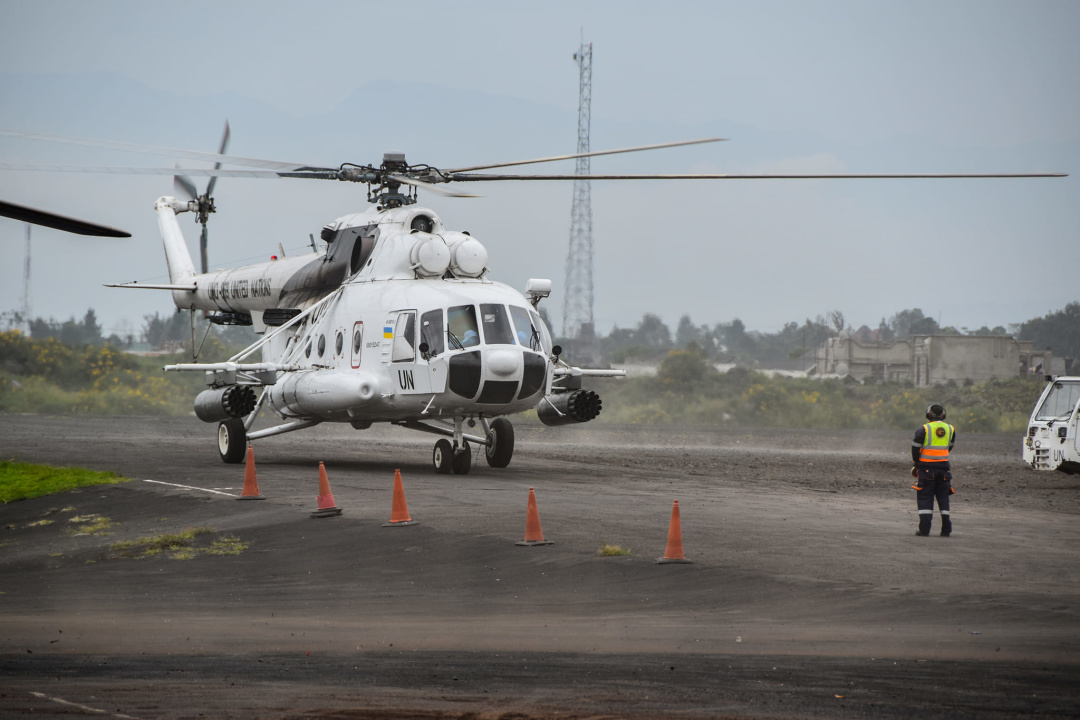
A Ukrainian Mi-8 helicopter is waiting to take off on a combat mission. Photo Credit: press service of the 18th Separate Helicopter Squadron
The locals knew that “Putin is a shit”
Ukrainian military servicemen had been part to the UN Stabilization Mission in the Democratic Republic of the Congo (MONUSCO) for over 10 years. We were respected. Because the Ukrainians never allowed themselves to behave shamefully towards the local population. Sometimes the Congolese could be heard saying “Glory to Ukraine!”. After the big war was already underway, we had an incident. We went to a store, and a boy of 16-17 years old came up to us, pointed to the side and said: “Look, there are Russians over there.” He knew that we are at war with them, that they are our enemies. Of course, we did not touch them, because we were wearing the uniform of our country — and the whole world was looking at us. Moreover, they were civilians. We didn’t encounter any of Russian military personnel out there.
There were four Russian UN civilian helicopters stationed nearby our base. After February 2022, they were redeployed to the other end of the airport so that no conflicts should arise. And the locals would be often heard saying “Putin is a shit.” Those who worked for us for a long time (for example, cleaners) learned some Ukrainian. They could easily speak to us in a kind of Surzhyk [which is bad, mostly Russian-inspired Ukrainian spoken predominantly in eastern and southern Ukraine]. Because many in our peacekeeping rotations still preferred speaking Russian over Ukrainian.
That was how intercommunication was established. The locals were very motivated by the fact that our people were generous, giving them the opportunity to earn money. Most are financially oriented. For money, you will be their best friend. At a local open-air market, for example, a kilogram of potatoes would cost me one dollar, but the locals would pay the same one dollar for five kilograms. For non-locals, they charged higher prices. And there are aplenty of them.
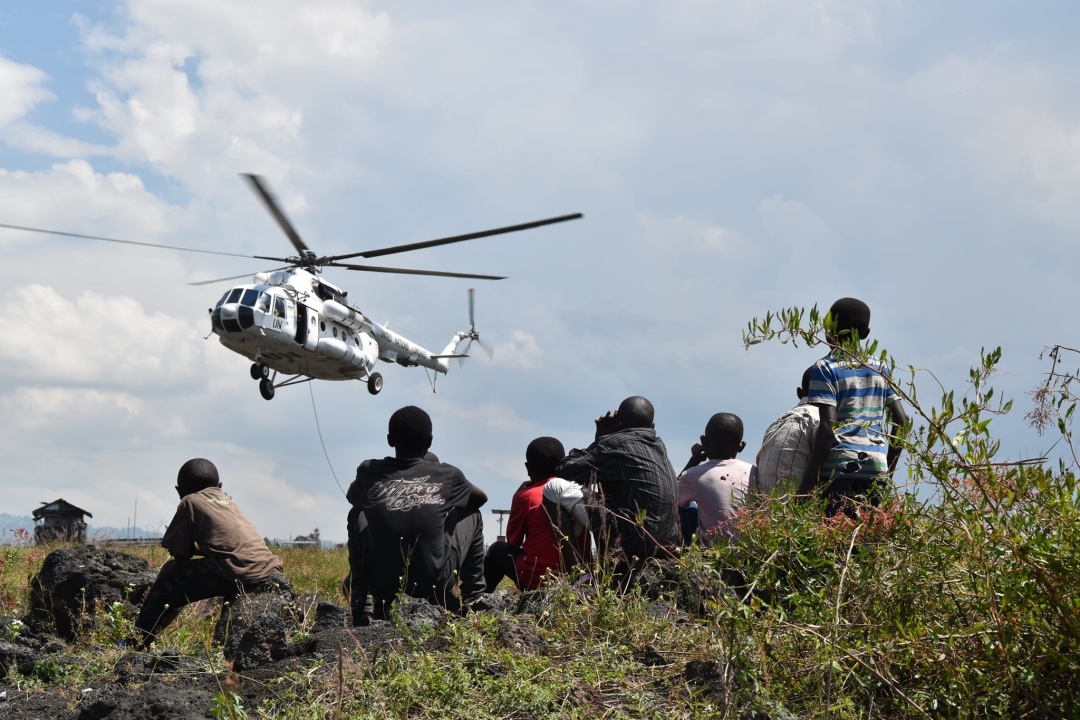
Photo Credit: press service of the 18th Separate Helicopter Squadron
Alongside us, peacekeepers from many other countries: China, Bangladesh, Uruguay, India, etc. were serving in that same mission. Our relations with them were excellent. There were no conflicts. However, they were shocked to learn that our senior lieutenant could be on duty guarding the airfield. Servicemen with officer ranks comprised some half of our unit. And they had one officer for every 50–60 people. They faint when they see a captain. And if they see a lieutenant colonel, they panic.
In the Army Aviation, there are more officers among pilots and the engineering and technical personnel. This is due to greater responsibility. But officers also account for 90% of those killed in the war. Because we are also Ground Forces.
On supplies and logistical support
The UN Mission provided supplies and logistical support for our operations. The monetary provisions were provided in foreign currency, which suited us a lot. It was a good amount of money, which was enough to buy, for example, an apartment in Kyiv upon return from the mission, depending on the duration of serving in a particular rotation. For some, the money earned serving in a peacekeeping mission became a kind of springboard into a new life. Supplies and logistical provisions satisfied all out needs. Our pilots never experienced a shortage of fuel for their missions. Everything we needed was in sufficient supply all the time.
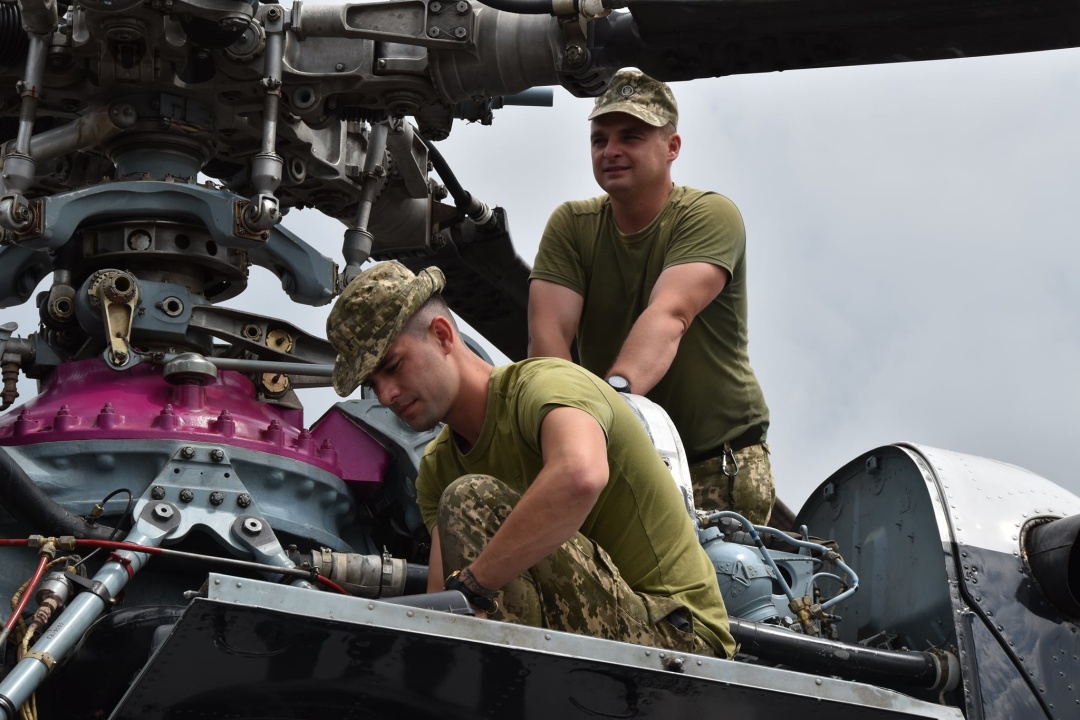
Aviation technicians perform helicopter maintenance works at scheduled times and according to their respective areas of expertise. Photo Credit: press service of the 18th Separate Helicopter Squadron
On African climate and health risks
The climate in the DR Congo is similar to a degree to that in our Kherson region, just a little hotter and more rainy. Hot and humid. That is, it was nothing new for the guys from Kherson who served in the rotation. The others got accustomed to it in a couple of months or so, and no one was concerned about the climate anymore.
I had a small trauma since childhood: I had a headache when the weather changed. In the DR Congo, this problem went away. Because we were stationed at an altitude of one and a half thousand meters above sea level, where air pressure is lower. During the year-long rotation, the headache never bothered me much.
Back in Poltava, at the training camp, we were vaccinated against everything possible: malaria, diphtheria, etc. – about 12 vaccinations in total. We were as well vaccinated against COVID-19 after six months, when already on rotation in the DR Congo. And every other month they gave us preventive pills for malaria. Because it is Africa, after all. We were once in an Indian medical camp. It was so sterile there that even on the street everything was shiny. They’re good guys.
On the Congolese customs and traditions
The first thing that caught my eye was that women work hard in the DR Congo. A woman can carry two buckets of water in her hands, something else on her head, plus a child hanging on her back. And at that very moment, a man is sitting at a fence, just spending time.
Also, the Congolese like to spend time at cemeteries, hang out on the graves playing cards, smoking. Our camp was located right next to a cemetery. Some of the graves were surrounded by fences, covered with roofs, locked with huge barn locks. Then I realized that this was to ensure fewer people would sit on them. But three months later, a lock was broken, and there were people inside. When it rained, everyone would hide under that canopy over the grave. Local boys, about 15 years old, were sitting on the graves near the camp, hoping that a soldier might come by and give them a candy or yogurt. There were a lot of beggar children there. That’s what particularly struck me.
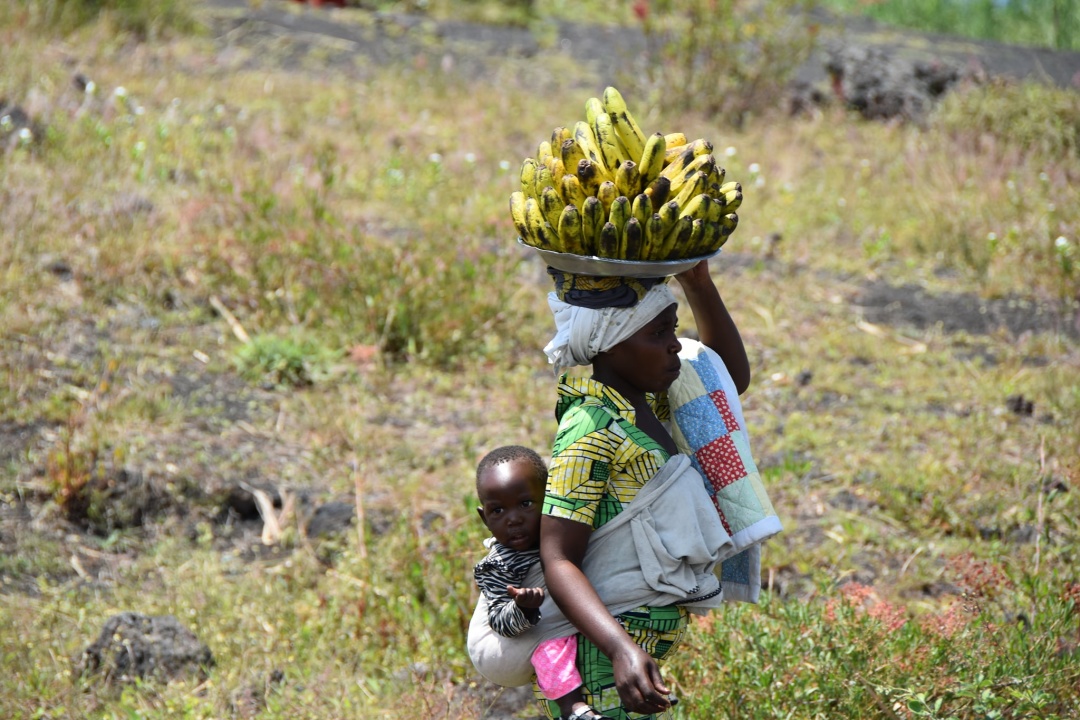
Congolese women work hard. Photo Credit: press service of the 18th Separate Helicopter Squadron
What I saw in the DR Congo convinced me that Ukraine still lives very well. There is something to eat, children are not hungry, they are not begging. They in Russia cannot believe that we have carpets hanging in every village house, there is electricity, in-house toilets. We are already removing those carpets from walls, but for the Russians, it is still considered chic.
We worked for the benefit of Ukraine even from the other side of the world
My parents are also military. When the war broke out on February 24, 2022, my mother was on duty in the Chornobaivka Brigade. She called me at 5 in the morning to say that the Chonhar Strait had been broken through. My wife calls and says: something is burning at our place. She showed me a video of a post-hit fire raging at our airfield (which was visible from our apartment). I woke up the guys, everyone jumped out of their beds and began calling their families to report about what had happened, and planning where to send their families so they are in safety. Because Poltava and Kherson cities had already been pounded by Russian bombs and missiles, the Russian troops had reached and passed through Oleshki, and battles for control over the Antoniv Bridge had begun. Overall mood was such that even those who never smoked before lit up cigarettes.
We immediately met our commander and demanded that he get us out of there, send us back to Ukraine. But the commander threw up his hands. First, he said, there is nothing to take you there. Second, we still have obligations to the UN Mission, a contract that we had to complete, because we were counted on. On the other hand, Ukraine was earning money on that. Therefore, at first, we brought money for armaments, for the needs of the Ukrainian army, the money which the UN paid for our participation.
We hardly slept during the first five days of the great war. Everyone was sitting in Telegram channels. We realized that while we couldn’t return, we had to do something there where we were. I contacted a comrade who served in the SBU [Security Service of Ukraine]. We found people who were in the already occupied territories and began to transmit information to the center.
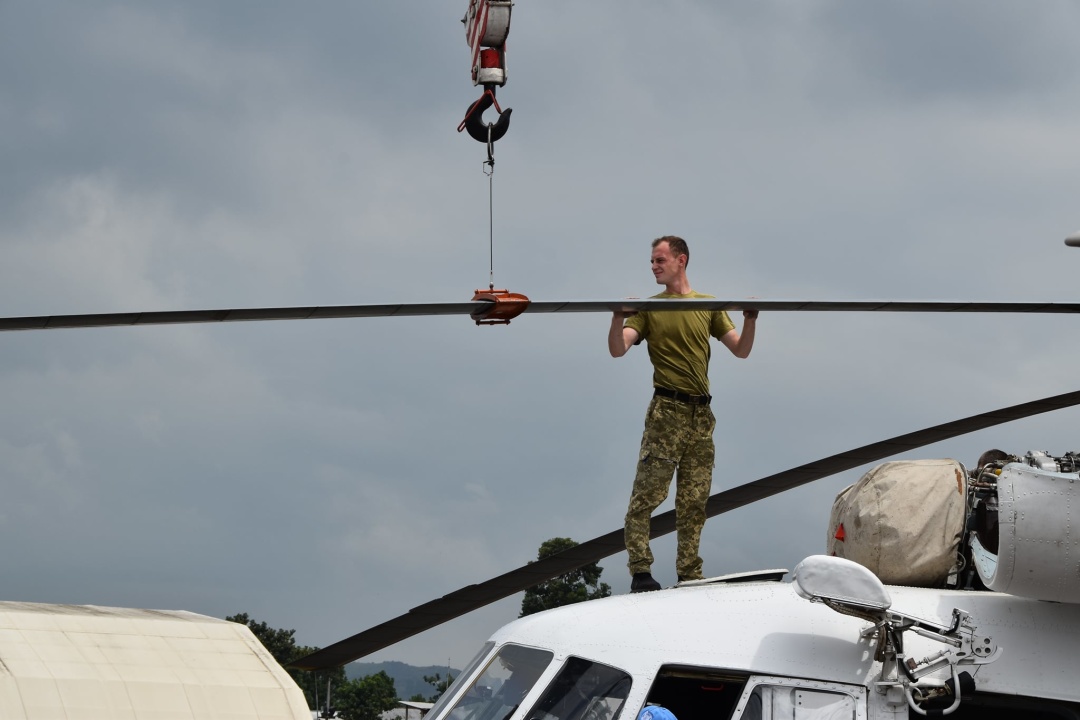
Servicing of helicopter propeller blades. Photo Credit: press service of the 18th Separate Helicopter Squadron
I was obtaining information about the developments taking place on the Mykolaiv-Snihurivka axis. Someone worked on the Antonivka side, that is, on Oleshki. Someone on the Stanislav side (a coastal village west of Kherson – ed.). Five of us were sitting in a room, transmitting information. Then we received messages confirming that something “happened” there, and we were very happy.
My wife and children lived for three months under occupation. In mid-April, they evacuated themselves through Snihurivka. I remember that day well. My wife called at six in the morning and said: “We are leaving” and hung up. Then I was suspended from work for the whole day. The boss said: “I understand. Your thoughts are only about your family now.” I remember that, in the evening, my fingers turned yellow from cigarettes. At eight in the evening my wife called again and said that they had already reached a territory controlled by the Ukrainian government, in the Mykolaiv region. And I was very relieved that everything ended well, that everyone was alive.
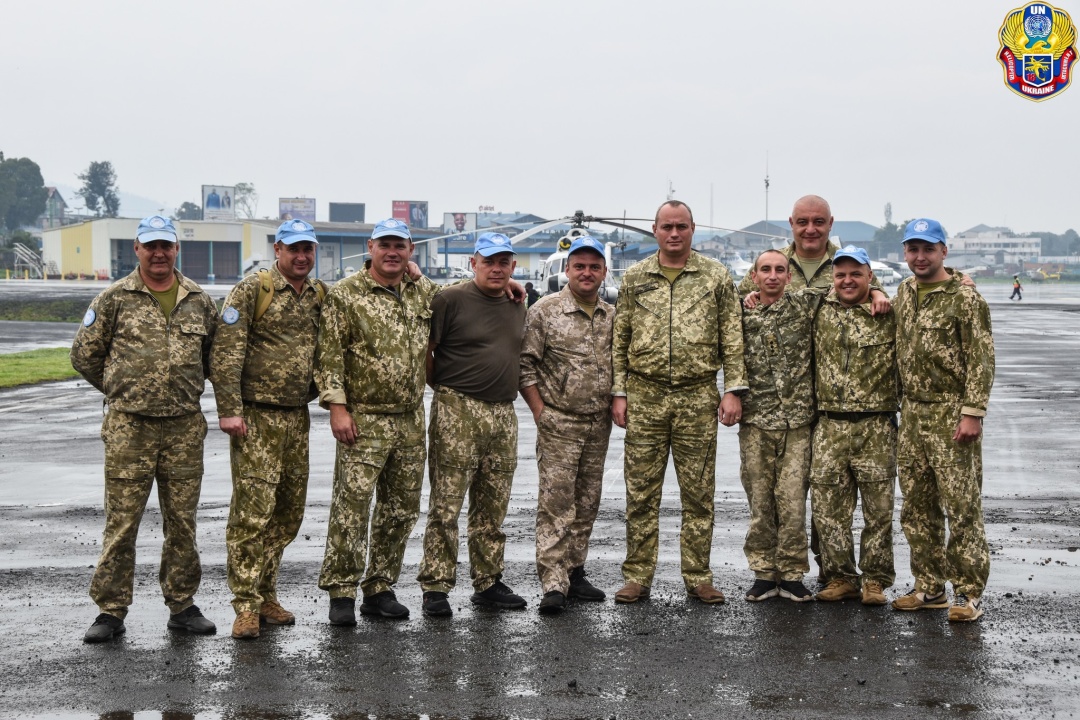
On the eve of returning to Ukraine. Photo Credit: press service of the 18th Separate Helicopter Squadron
Two days before the full-scale invasion, I told my wife to fill up our car with a full tank of gasoline. And it helped a lot. Because by the evacuation day, gas stations were not working. In Kherson city, gasoline was sold from barrels, but those who filled up from them stalled on the way out of the occupied areas. The gasoline was of poor quality. The journey was dangerous: eight Russian checkpoints and the ninth was Ukrainian.
Return to Ukraine
Someone stayed to settle pending matters; our camp was to be taken over by the Bangladeshis or Indians. Someone was loading equipment onto a ferry. Someone flew to the city of Entebbe, Uganda, to load helicopters. The rest of us boarded a plane together and flew to Poland, where we were put on buses – and we went home. When we saw the road sign reading “Ukraine”, we immediately shouted in unison, “Hurray! We’re home!”
The buses brought us to the Lviv Arena stadium, secretly so that no one would know. We transferred to military buses and were taken to the assembly point, from where we were directed to a military hospital for examination and tests. From there we were distributed to our duty stations.
The helicopters were transported on An-124 Ruslan military transports. One Ruslan can carry two or three helicopters. They are disassembled — the blades are removed, air is vented from the landing gear tires — and rolled into the plane. Having arrived in Poland, they were reassembled and flew to Ukraine under their own power.
Wounds, rehabilitation and adaptation to civilian life
Upon my return from the rotation, I learned that my native 11th Brigade was redeployed from Chornobayivka to the town of Brody in the Lviv region. Afterwards, I was transferred to Poltava, commissioned to the 18th Army Aviation Brigade. I was invited to a position that was more to my liking.
In April 2024, during a Russian missile attack, I lost my leg, and my comrade died. He features in the documentary “Lifting Force,” which was filmed at a base of our 18th Brigade.
I came to terms with the loss of my leg while still lying on the concrete. True, in the hospital I shouted that I wanted to serve, don’t write me off, etc. But the Military Medical Commission declared me unfit for military service in wartime. So now I am retired.
I had never been engaged in music before, but while at the Superhumans rehabilitation center, I tried my hand at DJing. In addition, a guitar teacher named Rostik used to visit us. It was easy for me to learn playing guitar.
I have an official recorded music set, plus one public performance — at the bar “Khvyloviy” in Kyiv. May 11 saw a presentation of the EnterDJ initiative, which provides training in DJing as art therapy for civilians and military personnel. And I played my first set at the opening of this presentation.
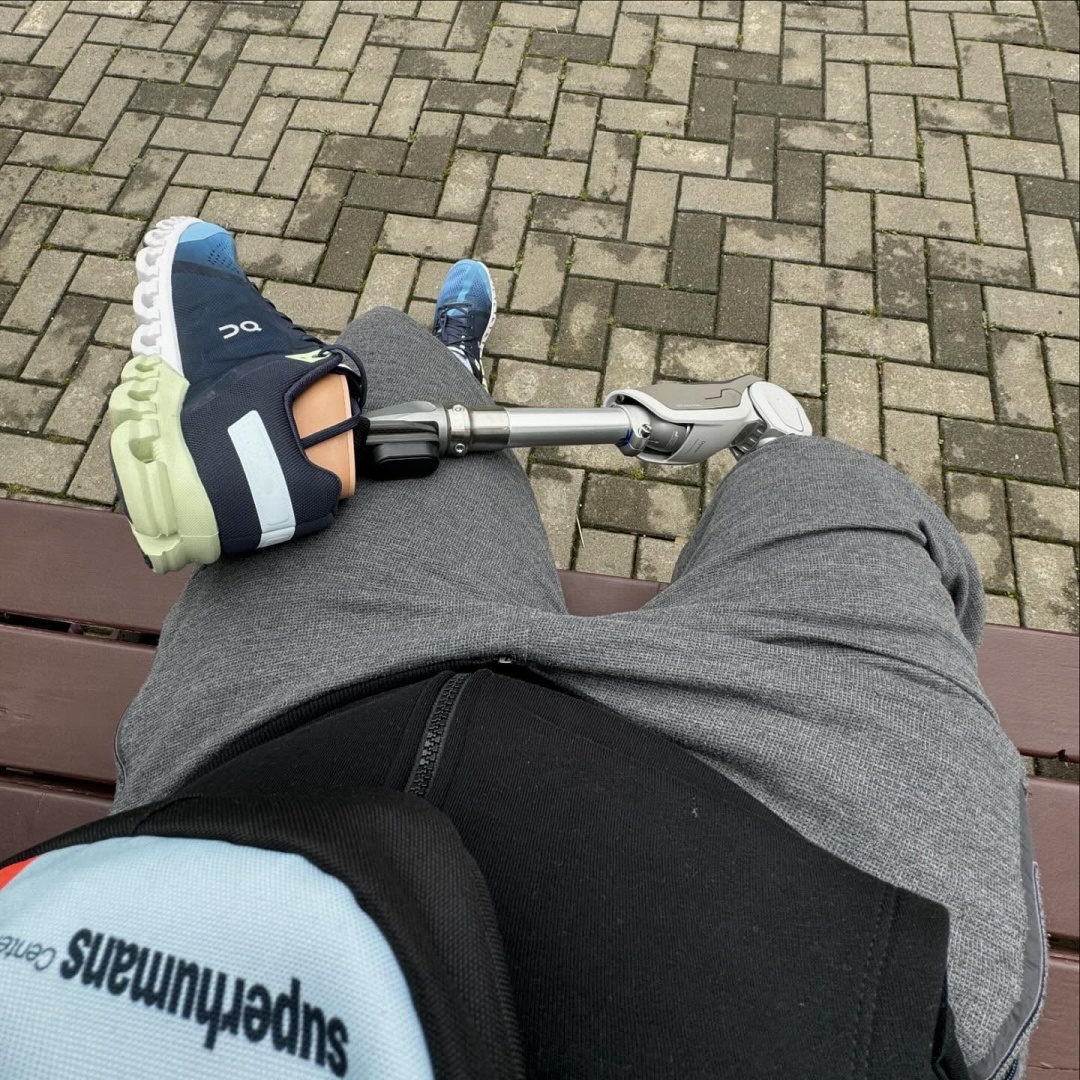
At the time being, Oleksandr has practically no physical limitations to deal with. The veteran easily moves wherever he needs to go, drives a car. Photo: Oleksandr Ivanko’s Facebook
I also run a small band where I perform as bass guitar player. We don’t stick to any specific style, just play everything we know. We even performed on the same stage with “Zhadan and Dogs” in Lviv on May 3 of this year. We played the song “Malvas”.
I am very grateful to the rehabilitation center for discovering my talent and giving me the opportunity to realize it. Grateful for being able to continue driving a manual transmission car with my right leg missing. I am the first in Superhumans to get on a manual transmission and drive. I love driving. The first thing I thought about after getting wounded was that I would be anymore able to drive a manual transmission car.
I have practically no physical limitations to worry about or deal with. I put on my prosthesis, can go where I need to, get on a train, a minibus, a car. I move around easily, can go uphill, go through a swamp, or over the grass if I need. It is only the swimming pool where I have to go with my prosthesis off. The only problem is that my speed has dropped.
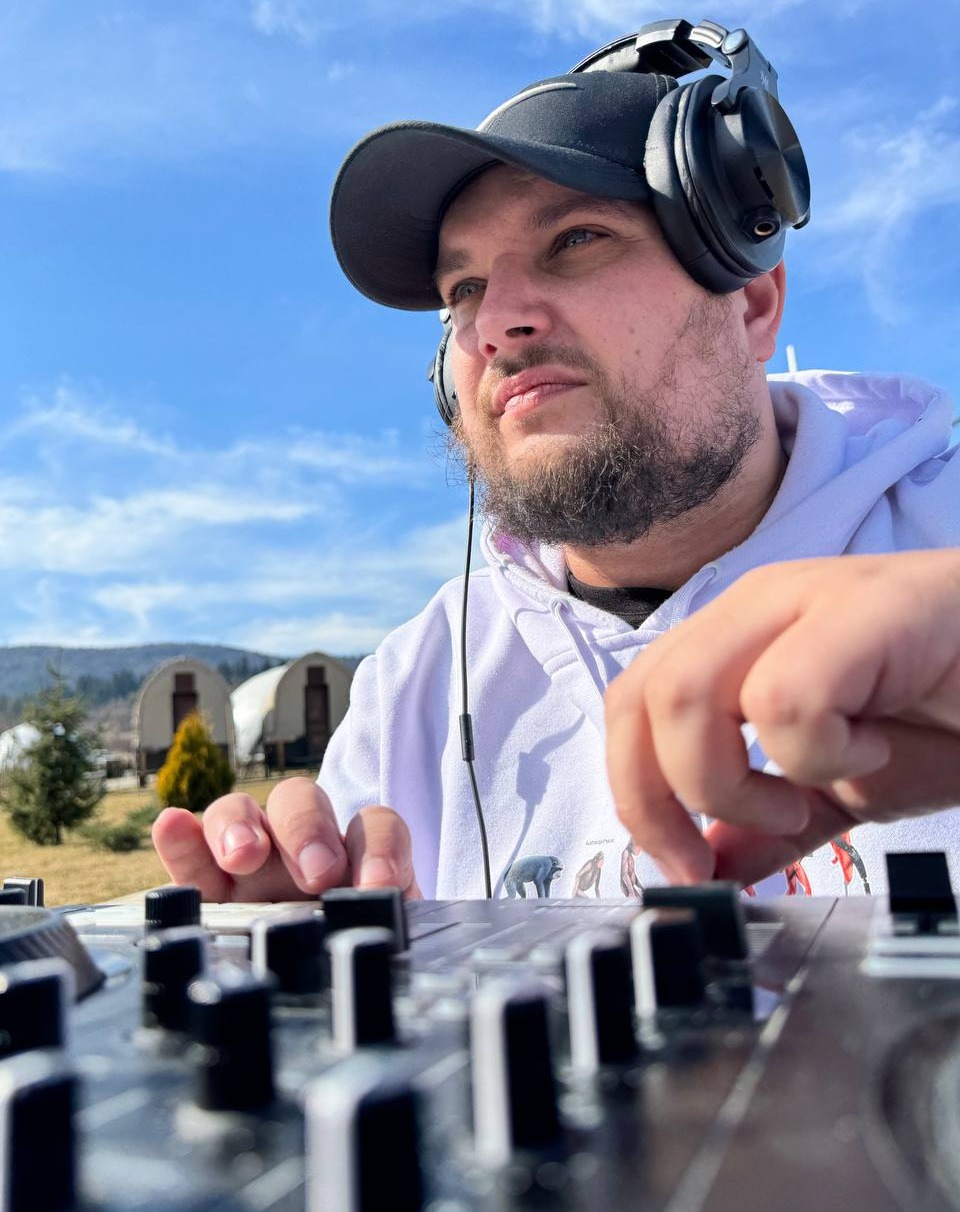
In the rehabilitation center, Oleksandr discovered his talent for music and became a DJ. Photo: Victory Beats
The value of peacekeeping activity for Ukraine
Ukraine’s participation in international peacekeeping missions is important in that it shows the Ukrainians in the international arena as professionals who help people. Secondly, it is profitable financially. The country earned decent money on our mission. And for the mission participants, it is an opportunity to earn money. Fourthly, it is a huge experience for pilots and engineers. Lots of sorties, lots of hours flown, a lot of work done. Flights were performed to distant locations from the base station, in challenging environments, always gave good skills, development. For example, I learned a lot of new things during the rotation. I used to deal with engines only previously, but during the rotation, I perfectly understood how a helicopter works. Now I can get into any system and see what works in it and what doesn’t.
Therefore please God and Ukraine, after we win, will resume participation in peacekeeping missions. And we will be a country with already enormous experience, and we will be treated with respect. And maybe we will be instructors ourselves, passing on our experience to others.
The conversation was led by Ihor Bihun, 1st Information and Communication Support Center, the Ground Force, the Armed Forces of Ukraine

